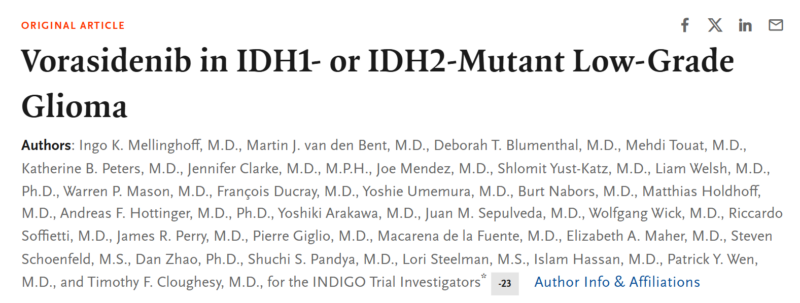Dana-Farber Cancer Institute shared on LinkedIn:
“In a global phase 3, double-blinded, randomized clinical trial, a precision therapy called vorasidenib more than doubled progression-free survival for patients with Grade 2 gliomas with IDH1 or IDH2 mutations. The therapy also delayed follow-up on treatment with radiation and chemotherapy even more substantially.
‘This is the first time a new agent has been introduced for the treatment of these tumors in more than 20 years,’ says Patrick Y. Wen, MD, Director of the Center for Neuro-Oncology at Dana-Farber and one of the trial’s three study chairs.
The INDIGO trial is the first phase 3 clinical trial of a molecularly targeted therapy for IDH-mutant glioma. The results were presented in a plenary session at the American Society for Clinical Oncology (ASCO) 2023 annual meeting and published in the New England Journal of Medicine.
Grade 2 gliomas are incurable brain tumors. IDH mutations are found in the vast majority of lower grade gliomas.
These tumors tend to appear in young people in their 30s or 40s. Current treatment involves surgery followed by radiation and chemotherapy. Radiation and chemotherapy are effective treatments, but within a few years of treatment, patients will experience signs of cognitive dysfunction normally seen in much older people.
Based on the trial results, treatment with vorasidenib can delay the need for treatment with radiation and chemotherapy. ‘By delaying these treatments, we are also able to delay cognitive dysfunction in patients and preserve their quality of life,’ says Wen.
The INDIGO trial enrolled 331 patients with Grade 2 IDH-mutated gliomas who had undergone surgery to remove the tumor. Patients who enrolled did not immediately need radiation and chemotherapy and instead were in a watch-and-wait period. During this time, they were randomized to take either vorasidenib or placebo.
Patients taking vorasidenib had a median of 27.7 months progression-free survival compared to 11.1 months for patients taking a placebo. The time to next treatment for patients taking the placebo was 17.8 months. For those taking vorasidenib, a median has not been determined because only 11.3% of these patients have so far progressed to the next treatment. The drug also had a manageable safety profile.
‘Tolerability is important because this is a drug that we expect people to be on for many years,’ says Wen.
IDH1 and IDH2 are enzymes that, when mutated, drive the growth of the cancer. Vorasidenib inhibits both IDH1 and IDH2 mutant enzymes and penetrates the blood-brain barrier. Vorasidenib showed strong signs of efficacy in a phase 1 trial co-led by Wen. That evidence became the basis for the INDIGO trial.
‘The majority of low-grade gliomas have IDH mutations, and the hope was that IDH inhibitors could slow tumor growth,’ says Wen.
More.”
Vorasidenib in IDH1- or IDH2-Mutant Low-Grade Glioma | NEJM
Authors: Ingo K. Mellinghoff, Martin J. van den Bent, Deborah T. Blumenthal, Mehdi Touat, Katherine B. Peters, Jennifer Clarke, Joe Mendez, Shlomit Yust-Katz, Liam Welsh, Warren P. Mason, François Ducray, Yoshie Umemura, Burt Nabors, Matthias Holdhoff, Andreas F. Hottinger, Yoshiki Arakawa, Juan M. Sepulveda, Wolfgang Wick, Riccardo Soffietti, James R. Perry, Pierre Giglio, Macarena de la Fuente, Elizabeth A. Maher, Steven Schoenfeld, Dan Zhao, Shuchi S. Pandya, Lori Steelman, Islam Hassan, Patrick Y. Wen, Timothy F. Cloughesy,

More posts featuring Dana-Farber Cancer Institute on oncodaily.com


